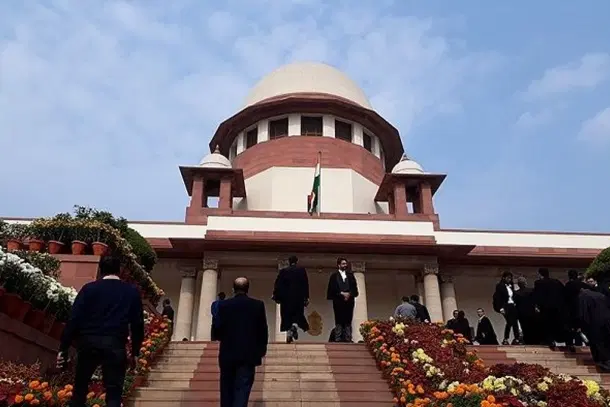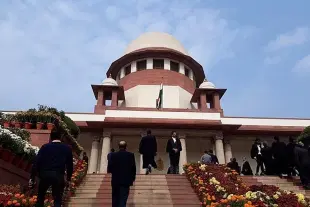Legal
"What Is Happening In Gujarat High Court?" SC Censures Gujarat HC, Permits Pregnancy Termination For Rape Survivor
Swarajya News Staff
Aug 21, 2023, 12:52 PM | Updated 12:52 PM IST
Save & read from anywhere!
Bookmark stories for easy access on any device or the Swarajya app.


The Supreme Court criticised the Gujarat High Court on Monday (21 August) for going against "constitutional philosophy" by passing an order that contradicted a ruling by a "superior court."
The Supreme Court expressed its displeasure after the High Court issued an order on Saturday (19 August), despite the fact that the Supreme Court had already scheduled a hearing on the matter for Monday.
The case pertains to a petition filed by a rape survivor seeking permission to terminate her pregnancy.
Although the High Court had denied her relief, the Supreme Court has granted her permission to terminate the pregnancy.
"What is happening in Gujarat High Court? No court in India can pass an order against a superior court order. It is against constitutional philosophy," the Supreme Court bench of Justice B V Nagarathna and Justice Ujjal Bhuyan said after it was informed of an order by the High Court on Saturday.
The Solicitor General Tushar Mehta, representing the Gujarat government, clarified that the order issued on Saturday was meant to rectify a "clerical error."
"There was a clerical error in the previous order and that was fixed on Saturday. It was a misunderstanding," he said, adding, "We as the state government will request the judge to recall the order."
The delay in deciding the rape survivor's petition by the High Court was flagged by the Supreme Court on Saturday, expressing concern over the loss of valuable time.
Justices Nagarathna and Bhuyan then said they would hear the matter on Monday.
The Supreme Court criticised the Gujarat High Court for its "lackadaisical attitude" and issued notices to the Gujarat government and others on Saturday. They sought responses regarding the woman's plea.
According to the rape survivor's counsel, she approached the Supreme Court on 7 August, and the matter was heard the following day. On 8 August, the High Court ordered the formation of a medical board to assess the petitioner's pregnancy and health condition.
After examination by a medical college, a report was submitted on 10 August, stating that the pregnancy could be terminated, as confirmed by the petitioner's counsel.
The Supreme Court observed that the High Court had taken the report on record on 11 August, but that "strangely" there was a delay of 12 days in listing the matter. This delay was deemed significant given the circumstances of the case.
The High Court, as per the top court, was "losing sight of the fact that every day's delay was crucial and of great significance having regard to the facts and circumstances of the case."
"In such cases, there must be, not undue urgency, but at least a sense of urgency in such matters and not a lackadaisical attitude of treating it as any normal case and just adjourning it. We are sorry to say and make this remark," the bench orally said.
Additionally, the bench pointed out that although the petitioner's counsel had informed them that the High Court had rejected the petition on 17 August, no reasons were provided and the order had not been uploaded on the court's website.
The petitioner's counsel then told the court that she would soon be approaching the 28th week of her pregnancy, adding that a fresh medical report should be sought. The court then asked the petitioner to appear before the medical board again.
Following fresh examination, the Supreme Court has granted permission for the termination of pregnancy.
"Subsequent to the medical procedure to be carried out, in the event the foetus is found to be alive, the hospital is to give all facilities including incubation to ensure the foetus survives. The State shall then take steps to ensure the child is adopted in accordance with law," the Supreme Court said.





